Paul Hovland
Argonne National Laboratory
BOOST: BOttleneck-Optimized Scalable Training Framework for Low-Rank Large Language Models
Dec 13, 2025



Abstract:The scale of transformer model pre-training is constrained by the increasing computation and communication cost. Low-rank bottleneck architectures offer a promising solution to significantly reduce the training time and memory footprint with minimum impact on accuracy. Despite algorithmic efficiency, bottleneck architectures scale poorly under standard tensor parallelism. Simply applying 3D parallelism designed for full-rank methods leads to excessive communication and poor GPU utilization. To address this limitation, we propose BOOST, an efficient training framework tailored for large-scale low-rank bottleneck architectures. BOOST introduces a novel Bottleneck-aware Tensor Parallelism, and combines optimizations such as online-RMSNorm, linear layer grouping, and low-rank activation checkpointing to achieve end-to-end training speedup. Evaluations on different low-rank bottleneck architectures demonstrate that BOOST achieves 1.46-1.91$\times$ speedup over full-rank model baselines and 1.87-2.27$\times$ speedup over low-rank model with naively integrated 3D parallelism, with improved GPU utilization and reduced communication overhead.
Transfer-Learning-Based Autotuning Using Gaussian Copula
Jan 09, 2024



Abstract:As diverse high-performance computing (HPC) systems are built, many opportunities arise for applications to solve larger problems than ever before. Given the significantly increased complexity of these HPC systems and application tuning, empirical performance tuning, such as autotuning, has emerged as a promising approach in recent years. Despite its effectiveness, autotuning is often a computationally expensive approach. Transfer learning (TL)-based autotuning seeks to address this issue by leveraging the data from prior tuning. Current TL methods for autotuning spend significant time modeling the relationship between parameter configurations and performance, which is ineffective for few-shot (that is, few empirical evaluations) tuning on new tasks. We introduce the first generative TL-based autotuning approach based on the Gaussian copula (GC) to model the high-performing regions of the search space from prior data and then generate high-performing configurations for new tasks. This allows a sampling-based approach that maximizes few-shot performance and provides the first probabilistic estimation of the few-shot budget for effective TL-based autotuning. We compare our generative TL approach with state-of-the-art autotuning techniques on several benchmarks. We find that the GC is capable of achieving 64.37% of peak few-shot performance in its first evaluation. Furthermore, the GC model can determine a few-shot transfer budget that yields up to 33.39$\times$ speedup, a dramatic improvement over the 20.58$\times$ speedup using prior techniques.
* 13 pages, 5 figures, 7 tables, the definitive version of this work is published in the Proceedings of the ACM International Conference on Supercomputing 2023, available at https://dl.acm.org/doi/10.1145/3577193.3593712
Understanding Automatic Differentiation Pitfalls
May 12, 2023

Abstract:Automatic differentiation, also known as backpropagation, AD, autodiff, or algorithmic differentiation, is a popular technique for computing derivatives of computer programs accurately and efficiently. Sometimes, however, the derivatives computed by AD could be interpreted as incorrect. These pitfalls occur systematically across tools and approaches. In this paper we broadly categorize problematic usages of AD and illustrate each category with examples such as chaos, time-averaged oscillations, discretizations, fixed-point loops, lookup tables, and linear solvers. We also review debugging techniques and their effectiveness in these situations. With this article we hope to help readers avoid unexpected behavior, detect problems more easily when they occur, and have more realistic expectations from AD tools.
ytopt: Autotuning Scientific Applications for Energy Efficiency at Large Scales
Mar 28, 2023



Abstract:As we enter the exascale computing era, efficiently utilizing power and optimizing the performance of scientific applications under power and energy constraints has become critical and challenging. We propose a low-overhead autotuning framework to autotune performance and energy for various hybrid MPI/OpenMP scientific applications at large scales and to explore the tradeoffs between application runtime and power/energy for energy efficient application execution, then use this framework to autotune four ECP proxy applications -- XSBench, AMG, SWFFT, and SW4lite. Our approach uses Bayesian optimization with a Random Forest surrogate model to effectively search parameter spaces with up to 6 million different configurations on two large-scale production systems, Theta at Argonne National Laboratory and Summit at Oak Ridge National Laboratory. The experimental results show that our autotuning framework at large scales has low overhead and achieves good scalability. Using the proposed autotuning framework to identify the best configurations, we achieve up to 91.59% performance improvement, up to 21.2% energy savings, and up to 37.84% EDP improvement on up to 4,096 nodes.
Customized Monte Carlo Tree Search for LLVM/Polly's Composable Loop Optimization Transformations
May 10, 2021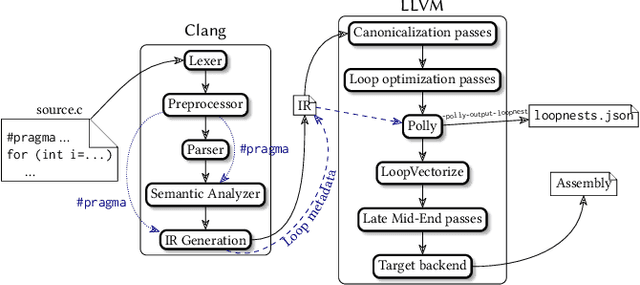
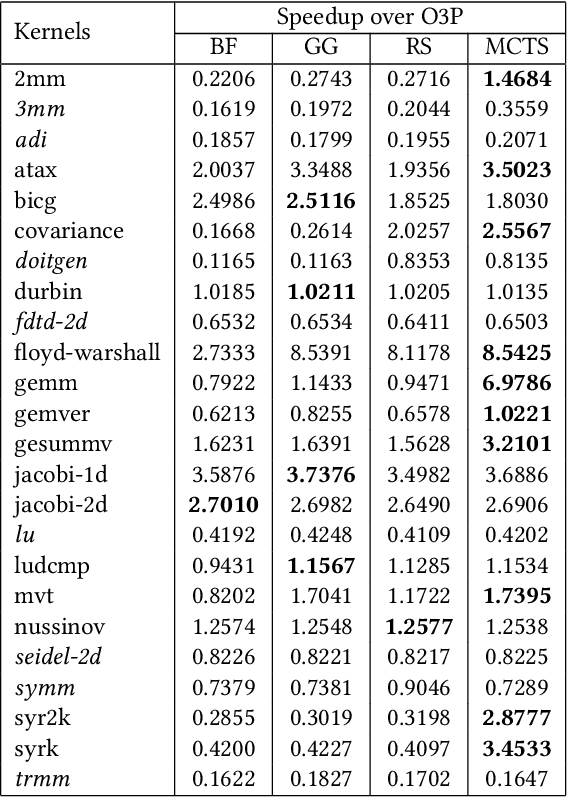


Abstract:Polly is the LLVM project's polyhedral loop nest optimizer. Recently, user-directed loop transformation pragmas were proposed based on LLVM/Clang and Polly. The search space exposed by the transformation pragmas is a tree, wherein each node represents a specific combination of loop transformations that can be applied to the code resulting from the parent node's loop transformations. We have developed a search algorithm based on Monte Carlo tree search (MCTS) to find the best combination of loop transformations. Our algorithm consists of two phases: exploring loop transformations at different depths of the tree to identify promising regions in the tree search space and exploiting those regions by performing a local search. Moreover, a restart mechanism is used to avoid the MCTS getting trapped in a local solution. The best and worst solutions are transferred from the previous phases of the restarts to leverage the search history. We compare our approach with random, greedy, and breadth-first search methods on PolyBench kernels and ECP proxy applications. Experimental results show that our MCTS algorithm finds pragma combinations with a speedup of 2.3x over Polly's heuristic optimizations on average.
Autotuning PolyBench Benchmarks with LLVM Clang/Polly Loop Optimization Pragmas Using Bayesian Optimization (extended version)
Apr 27, 2021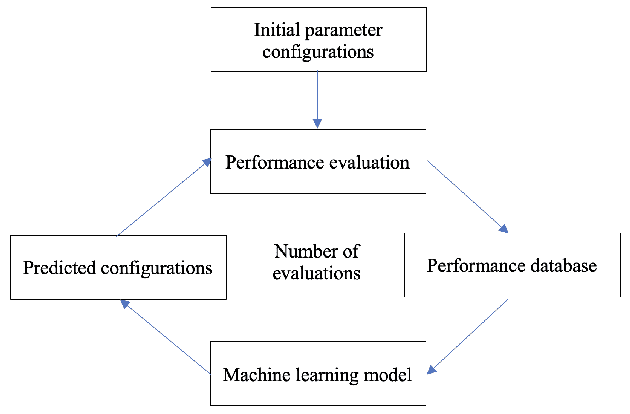

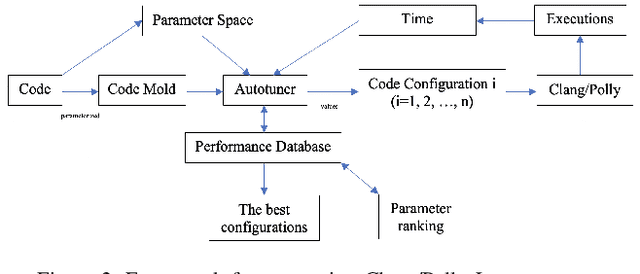

Abstract:In this paper, we develop a ytopt autotuning framework that leverages Bayesian optimization to explore the parameter space search and compare four different supervised learning methods within Bayesian optimization and evaluate their effectiveness. We select six of the most complex PolyBench benchmarks and apply the newly developed LLVM Clang/Polly loop optimization pragmas to the benchmarks to optimize them. We then use the autotuning framework to optimize the pragma parameters to improve their performance. The experimental results show that our autotuning approach outperforms the other compiling methods to provide the smallest execution time for the benchmarks syr2k, 3mm, heat-3d, lu, and covariance with two large datasets in 200 code evaluations for effectively searching the parameter spaces with up to 170,368 different configurations. We find that the Floyd-Warshall benchmark did not benefit from autotuning because Polly uses heuristics to optimize the benchmark to make it run much slower. To cope with this issue, we provide some compiler option solutions to improve the performance. Then we present loop autotuning without a user's knowledge using a simple mctree autotuning framework to further improve the performance of the Floyd-Warshall benchmark. We also extend the ytopt autotuning framework to tune a deep learning application.
Autotuning PolyBench Benchmarks with LLVM Clang/Polly Loop Optimization Pragmas Using Bayesian Optimization
Oct 15, 2020



Abstract:An autotuning is an approach that explores a search space of possible implementations/configurations of a kernel or an application by selecting and evaluating a subset of implementations/configurations on a target platform and/or use models to identify a high performance implementation/configuration. In this paper, we develop an autotuning framework that leverages Bayesian optimization to explore the parameter space search. We select six of the most complex benchmarks from the application domains of the PolyBench benchmarks (syr2k, 3mm, heat-3d, lu, covariance, and Floyd-Warshall) and apply the newly developed LLVM Clang/Polly loop optimization pragmas to the benchmarks to optimize them. We then use the autotuning framework to optimize the pragma parameters to improve their performance. The experimental results show that our autotuning approach outperforms the other compiling methods to provide the smallest execution time for the benchmarks syr2k, 3mm, heat-3d, lu, and covariance with two large datasets in 200 code evaluations for effectively searching the parameter spaces with up to 170,368 different configurations. We compare four different supervised learning methods within Bayesian optimization and evaluate their effectiveness. We find that the Floyd-Warshall benchmark did not benefit from autotuning because Polly uses heuristics to optimize the benchmark to make it run much slower. To cope with this issue, we provide some compiler option solutions to improve the performance.
Automatic Differentiation for Adjoint Stencil Loops
Jul 05, 2019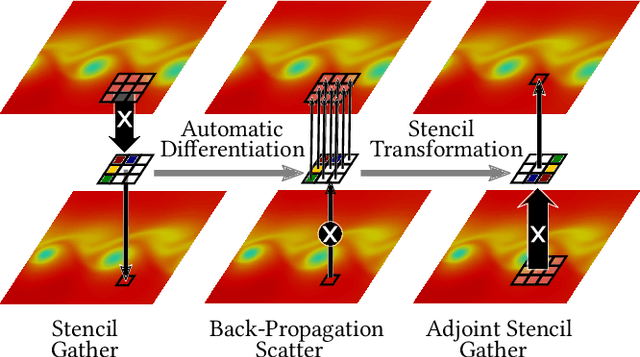
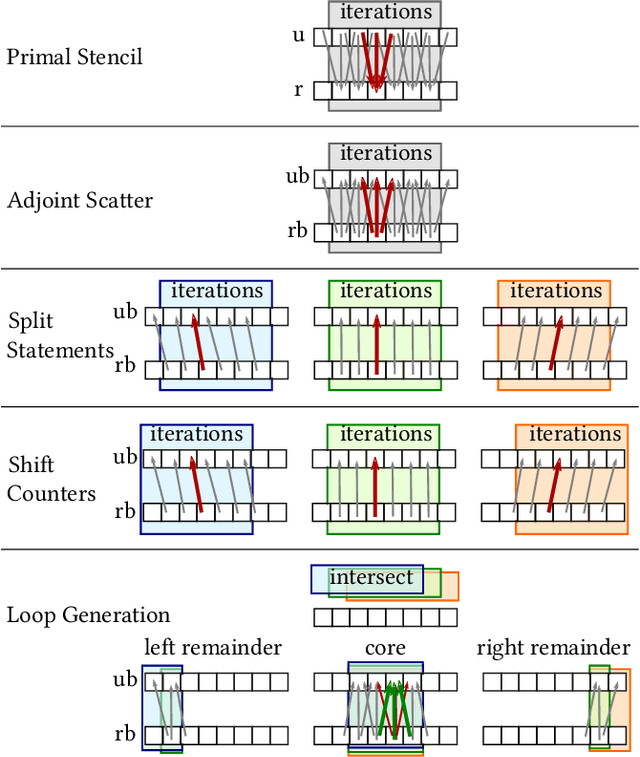
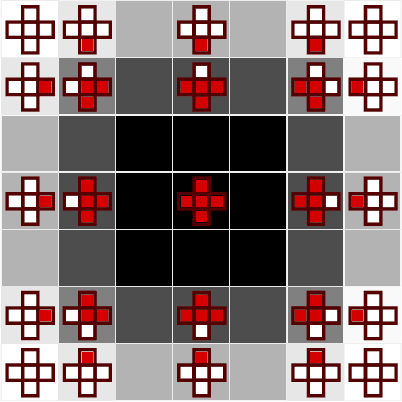
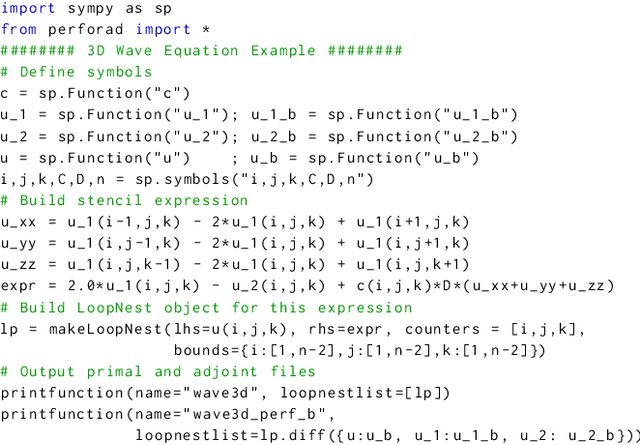
Abstract:Stencil loops are a common motif in computations including convolutional neural networks, structured-mesh solvers for partial differential equations, and image processing. Stencil loops are easy to parallelise, and their fast execution is aided by compilers, libraries, and domain-specific languages. Reverse-mode automatic differentiation, also known as algorithmic differentiation, autodiff, adjoint differentiation, or back-propagation, is sometimes used to obtain gradients of programs that contain stencil loops. Unfortunately, conventional automatic differentiation results in a memory access pattern that is not stencil-like and not easily parallelisable. In this paper we present a novel combination of automatic differentiation and loop transformations that preserves the structure and memory access pattern of stencil loops, while computing fully consistent derivatives. The generated loops can be parallelised and optimised for performance in the same way and using the same tools as the original computation. We have implemented this new technique in the Python tool PerforAD, which we release with this paper along with test cases derived from seismic imaging and computational fluid dynamics applications.
 Add to Chrome
Add to Chrome Add to Firefox
Add to Firefox Add to Edge
Add to Edge